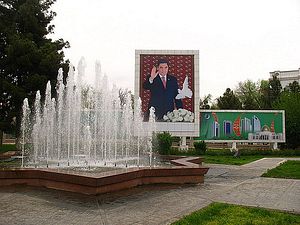If official statements are to be believed, 97.27 percent of Turkmen voters showed up to Sunday’s presidential polls and, choosing from nine candidates, 97.69 of voters cast ballots for incumbent President Gurbanguly Berdymuhamedov. It’s a crushing victory to rival that of Central Asia’s other wildly successful presidents.
The official statements are unbelievable. The turnout is more absurd than Berdymuhamedov’s victory margin. Given the country’s hermetic and repressive nature, there are no comprehensive independent polls and the election monitoring that did happen is about as much a sham as the election.
Election monitoring missions were organized by the Commonwealth of Independent States (CIS) and also the Shanghai Cooperation Organization (SCO), both of which have a track record of calling “free and fair” what the Organization for Security and Cooperation in Europe (OSCE) calls foul when it comes to regional elections.
In the case of Turkmenistan, the OSCE only dispatched an “election assessment mission” which, “In line with OSCE/ODIHR methodology… [does not] not carry out systematic or comprehensive observation of the voting, counting, and tabulation on election day.” Unlike election observation missions, the mission is limited in scope to observing specific issues and does “not draw an overall conclusion about an election’s compliance with OSCE commitments, other international standards and national legislation…”
The rationale for not dispatching a full election observation mission appears to be one of access. The early December needs assessment mission (NAM) put it like this:
All of the OSCE/ODIHR NAM interlocutors emphasized the need for an OSCE/ODIHR election observation activity for the presidential election. Considerate of the continued declared interest of the authorities of Turkmenistan to maintain a dialogue with the OSCE/ODIHR on electoral reform, the OSCE/ODIHR NAM recommends the deployment of an Election Assessment Mission (EAM). (emphasis mine)
The logic, perhaps, is that any mission is better than none. Ashgabat can be sure that in eight weeks, when the OSCE’s EAM releases its report (there is no interim, immediate report as in election observation missions) the Turkmen election will be even further from news headlines and international attention than it already is. That bone-dry report will be read by few and read selectively in Ashgabat, with highlights on compliments regarding legal structures and orderly voting and willful neglect of comments regarding media freedom and standards of democratic elections.
The OSCE sent an EAM to Turkmenistan’s 2013 parliamentary election and only did NAMs for the 2012 presidential election, the 2008 early parliamentary elections, and 2007 presidential election.
This is a progression of sorts, but it is not indicative of real progress. Given constitutional changes last year that lengthened the presidential term to seven years from five and removed the age cap (which previously ruled out candidates over age 70), 58-year-old Berdymuhamedov doesn’t have to think about elections until 2024 and can run indefinitely.
Turkmenistan’s repressive media environment does not lend itself to comprehensive election coverage. But the anecdotal and opposition reporting is powerful.
An Ashgabat taxi driver told the AFP he wouldn’t be voting because he’s registered in another region. Further, he said, “I don’t think my vote would affect anything anyway.”
Alternative Turkmenistan News (ATN) ran a secretive survey of voters ahead of the election. The interviewers asked a simple question — “Will you vote for Gurbanguly Berdymuhamedov?” — to 216 people, mostly family and friends of the interviewers as “such campaigns are risky in Turkmenistan, and also because most citizens live in fear and never voice their opinions on any subject.” Though far from a scientific poll, the answers remain illustrative. A fifth of the respondents said they would vote for Berdymuhamedov. One man’s reason:
“During Niyazov’s rule, I lost two sons… Heroin took them both away from me when they were still very young. I will be forever grateful to the president for eliminating drugs in Turkmenistan.”
A woman phrased her rationale like this:
“Other candidates could be nice people, but I have never heard about them before, and neither have other people. Had it not been for the elections, I would have never learned about them. Everybody has kind of got used to Berdymuhamedov; besides, he at least restored pensions to the elders.”
An official from one region’s prosecutor’s office said “he and his colleagues were told to vote only for the main candidate, ‘otherwise you’ll be considered a traitor.’”
RFE/RL’s Turkmen Service reported that ahead of the election “students at a school in Ashgabat were tasked with filling in ballots in favor of the country’s president.” The ballots, a source said, “…are to be put in ballot boxes for the people who will not show up.”
Berdymuhamedov may not need to think about an election until 2024, but Turkmenistan’s problems will continue to mount. According to the AFP, when Berdymuhamedov cast his ballot he said the election would decide “the fate of the people for the coming seven years… If I am elected then our policies aimed at improving the welfare of the people will continue.”
































